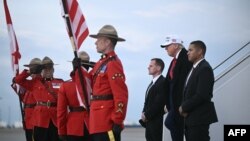Israel and Iran kept up their attacks on each other on June 15 as leaders of the Group of Seven began gathering in Canada for a summit expected to discuss the fighting and ways to keep the conflict from further escalating.
The war in Ukraine also will be on the agenda at the three-day meeting of the leaders of Britain, Canada, France, Germany, Italy, Japan, and the United States in Kananaskis, Canada. Ukrainian President Volodymyr Zelenskyy is due to attend and is expected to meet with US President Donald Trump.
Before leaving Washington for the summit on June 15, Trump was asked what steps he was taking to de-escalate the conflict between Israel and Iran.
"I hope there's going to be a deal,” he said. “I think it's time for a deal. But sometimes they have to fight it out."
Trump has lauded Israel's offensive while denying Iranian allegations that the United States has taken part and warning Tehran not to widen its retaliation to include US targets.
European Commission President Ursula von der Leyen said she told Israeli Prime Minister Benjamin Netanyahu in a telephone call on June 15 that diplomacy was the best path to a solution.
Speaking at a press briefing at the G7, von der Leyen placed the blame for the fresh violence on Iran, pointing to the UN nuclear watchdog's finding earlier in the week that it was not in compliance with its obligations.
"In this context, Israel has the right to defend itself. Iran is the principal source of regional instability," von der Leyen said.
She said that the G7 summit should discuss the Iran crisis alongside Ukraine, which has been hit by drones sold to Russia by Tehran.
"The same type of Iranian-designed and -made drones and ballistic missiles are indiscriminately hitting cities in Ukraine and in Israel. As such, these threats need to be addressed together," she said.
Von der Leyen also said more pressure must be exerted on Russia to secure a cease-fire in Ukraine.
But the back-and-forth attacks being carried out by Israel and Iran and efforts to avoid escalation are likely to compete closely with the war in Ukraine for attention at the summit.
Israel said it launched the attacks to prevent Iran from developing a nuclear weapon. It killed top commanders and scientists in its initial surprise strike on June 13. Since then the Iranian Health Ministry said 224 people have been killed. Spokesman Hossein Kermanpour said that 1,277 other people were hospitalized and more than 90 percent of the casualties were civilians.
At least 10 people in Israel, including children, have been killed so far, according to authorities there.
In the initial waves of attacks, Israel appeared to avoid striking Iran's energy infrastructure, but Iran's Oil Ministry early on June 15 said Israeli strikes had hit two fuel depots in Tehran.
Israel said its attacks on June 15 hit Iran's Defense Ministry, missile launch sites, and factories producing air defense components.
Iranian state-linked media acknowledged explosions and fires stemming from an attack on an Iranian refueling aircraft in Mashhad deep in the country's northeast.
Israel said Iranian missiles struck Tel Aviv and the port city of Haifa early on June 16, destroying homes. Israeli media reported that three people were killed in the country's center, while dozens more were wounded in the overnight strikes.
Amid fears that the conflict could escalate, Foreign Minister Abbas Araqchi told state media that continuing nuclear negotiations with the United States would be unjustifiable, and Iranian General Esmail Kosari said Tehran was considering closing the Strait of Hormuz, one of the world's most important shipping routes.
There are fears that the violence could spread throughout the Middle East, a region that has been on edge since Hamas attacked southern Israel on October 7, 2023, and Israel retaliated by seeking to annihilate Hamas in the Gaza Strip.










